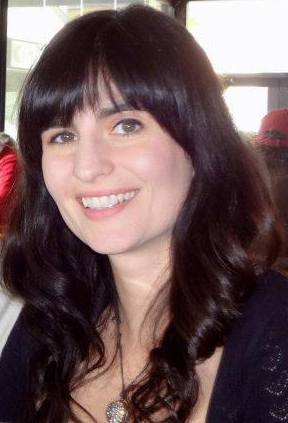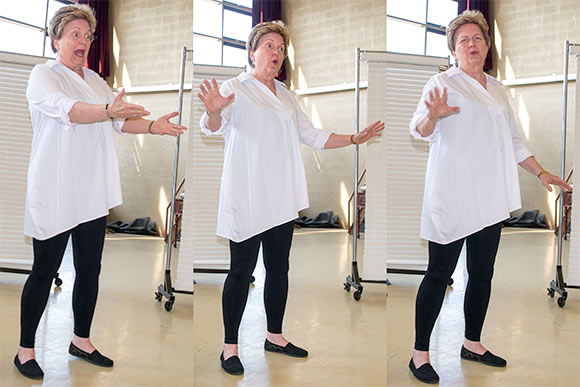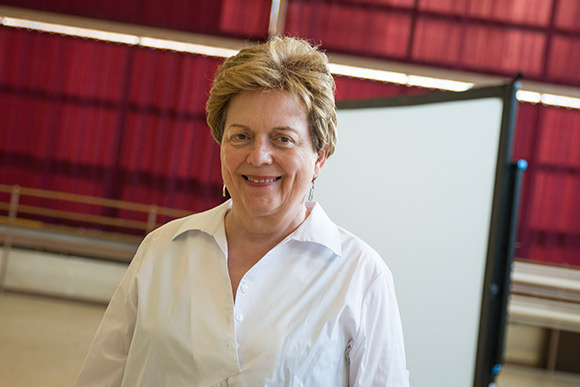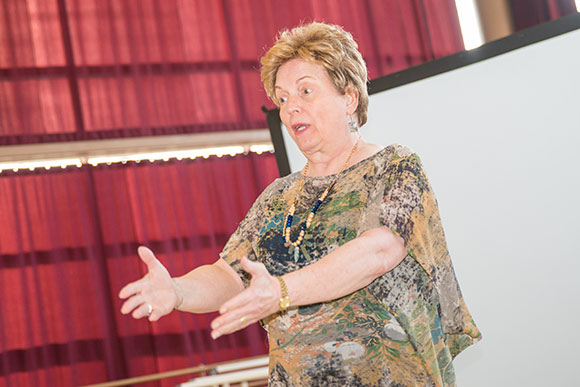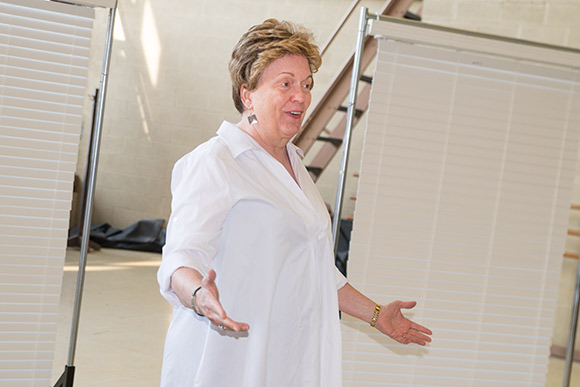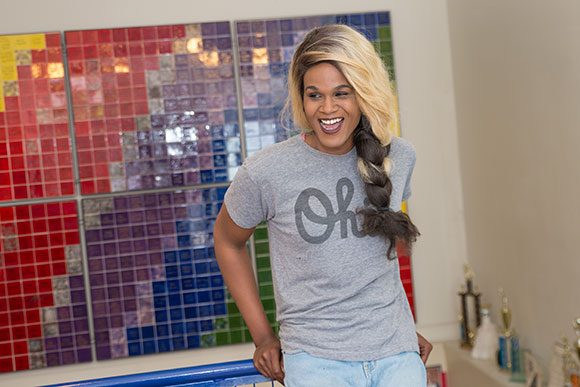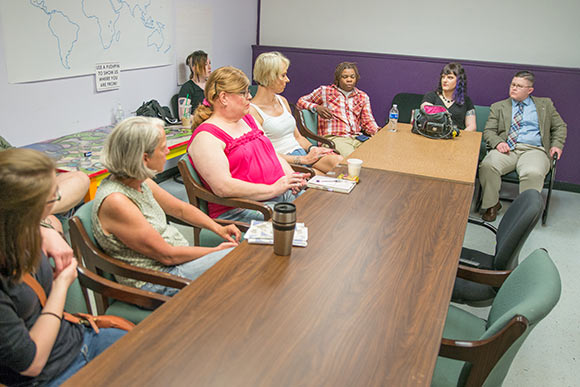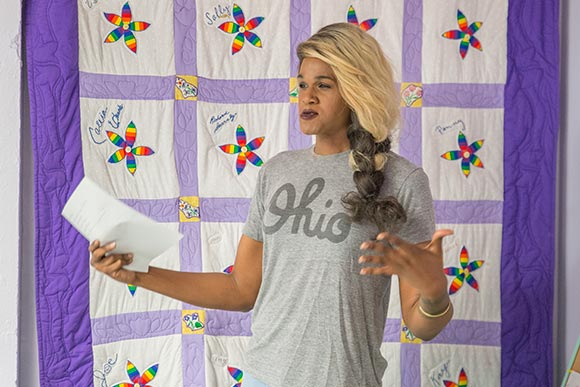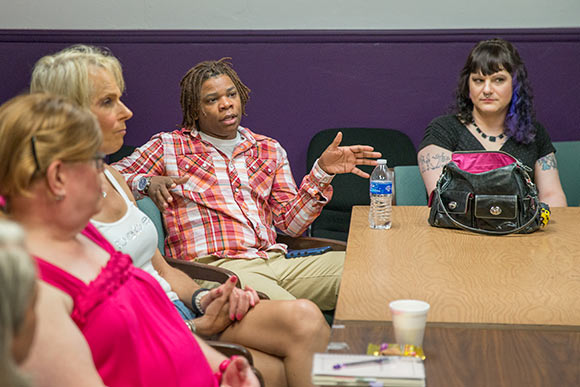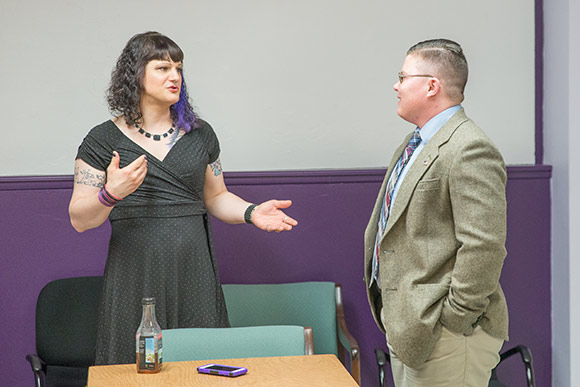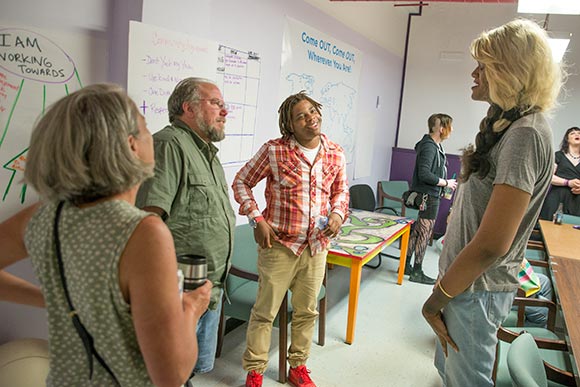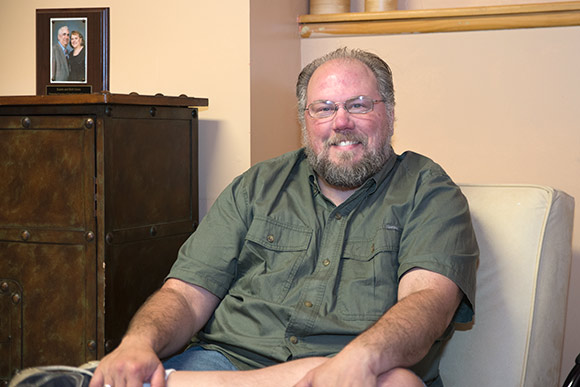One woman show spotlights transgender lives in Cleveland
Twenty-five years before Bruce Jenner asked the world to call her Caitlyn, Dick Howey asked Cleveland to call her Christine.
Howey, a journalist, actor and poet, transitioned in 1990, before she had access to the Internet and before television shows depicted transgender individuals. She decided to live as the woman she always knew she was when “gender identity disorder” was still medically classified as a mental illness and transgender individuals were not so visible.
“Transgender issues recently have gotten a lot of coverage. There are a lot of shows, excellent shows like ‘Transparent,’ ‘Orange [is the New Black],’” says Howey, who lives in her hometown of Cleveland Heights. “Typically, transgender people have really been far behind the gay community in terms of acceptance or visibility, and some of us in the trans community are responsible for that because if you pass, well, a lot of people just disappear.”
Vanity Fair’s interview with Jenner and photos by Annie Leibovitz have sparked a national conversation about transgender men and women, their lives, struggles and progress. Howey has furthered that discussion locally with her one-woman show, Exact Change, which chronicles her life and will debut at Playhouse Square tonight.
Exact Change marks the first time a publicly transgender individual has performed a solo show on a Playhouse Square stage. Cleveland made history back in the 1970s, when it was one of the first cities in the U.S. to establish an LGBT center. And last summer, it played host to the Gay Games, one of the largest sports festivals in the world. There are also countless groups, organizations and advocates in the area, including TransFamily, a transgender support group, Dare2Care, a nonprofit that trains youth leaders to bring awareness to and prevent LGBT bullying in schools and the community, and Margie’s Hope, which is working to provide housing for transgender individuals who are homeless.
At the same time, however, LGBTQ activists say that Cleveland and Ohio lags behind other states and cities that have passed fully inclusive, non-discrimination protections, which protect both sexual orientation and gender identity or expression in the areas of housing, employment and public accommodations.
But activists say citizens of Cleveland are ready for a change, and intimate, real stories like Howey’s help.
A powerful, poignant story
Since Howey’s play had its world premiere last year at Cleveland Public Theatre, nearly half of the show, which includes 40 of her poems and is nearly 12,000 words, has changed. There are more personal moments portraying her relationships with her ex-wife, Dinah, and daughter, Noelle.
Howey quickly jumps in and out of characters, changing her voice and expression with such precision and raw emotion that it’s easy to forget there’s only one person on the minimalist set.
In one terrifying and heartbreaking scene, she darts behind the blinds after being spotted and verbally assaulted by a group of teenagers at a department store. It would be a year before she went out dressed as Christine again. She also includes a moving scene where she passes, and what it meant to her. Dressed in black leggings and a nearly knee-length, blousy white-collared shirt and wearing only light makeup, passing has been easier as she’s aged.
“I’m sort of fortunate that I can go through the world now and people don’t stop and stare and point. Some people can’t. It’s all very individual. Some people never have that ability for one reason or another,” Howey says. “But if I’m not careful about how I look, that gets scary again. One time I was out walking, and I didn’t have my wig on because I didn’t want to sweat into it, so I just had a hat that I thought was OK but it wasn’t. Teenagers came by and said, ‘Hey are you a man or a woman?’ And they started following me, and it’s hard.”
Perhaps the most poignant scene and one that Howey cited as one of the most powerful involves her daughter, Noelle, when she was a toddler. Howey plays Dick in that scene, sitting on a recliner, remote in one hand and scotch in the other. Noelle crawls up onto her lap, and Howey doesn’t hug her back. “If I become a man so well that everyone thinks I’m a man, the real person in me will disappear, and so I didn’t hug her, and that’s a terrible, terrible memory to have,” she says. In a rehearsal before the show, tears streamed down Howey’s face and it took acting through another scene until they dried.
“The play provides another perspective because a lot of the things that are happening now are either real, like Caitlyn Jenner, or they’re fiction, like those shows. But [Exact Change] is a combination,” she says. “It’s a real story that is presented in an entertaining, theatrical context and that has the ability to break down barriers.”
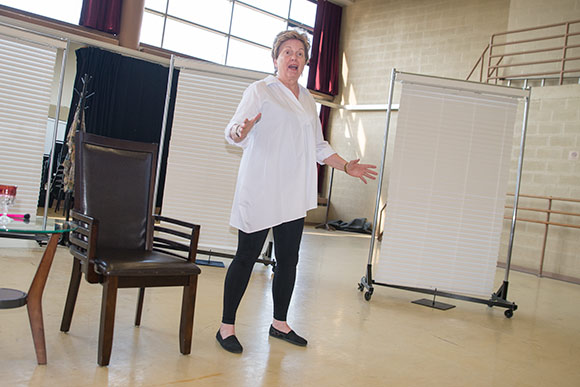
Finding the stage again
Before Chris Howey transitioned, she found solace on the stage.
“I was only relaxed when I was on stage because I had the lines. See, I didn’t know what to say as a guy. I listened very carefully and I mimicked and I learned how guys talk,” Howey said. “I studied guys like graduate school courses and how they acted so I wouldn’t be spotted.”
She was a noted actor at Dobama Theatre until 1984, and played leading male roles like Goebbels, Lucifer, “Terrible Jim Fitch” and Richard Nixon, some of whom make cameos in Exact Change.
“But it didn’t come naturally to me. I actually thought if I took enough male roles -- because I always played the heavies -- I thought eventually it would just kick in magically, and it didn’t.”
After she transitioned, she feared she’d lose her job, but she continued working in the advertising industry and with the same company. Though it took some time, both Dinah and Noelle supported her, and she is close with both still today. In the late ’90s, she started writing theater reviews, and is now a critic for Scene.
But it took nearly 30 years until she’d grace the stage again as Christine in Exact Change, directed by Scott Plate, who has been with the show since the beginning. The play itself came about organically.
“It sort of crept up on me really slowly because I had been in a poetry workshop, and I had been reading poems in my voice as Christine. One day I thought of this poem that I wrote in the voice of Terrible Jim Fitch, who was a character I played years and years ago. I read the poem in that voice, and everybody was like,” Howey stops, and acts out people’s wide-eyed, open-mouthed reactions. “I said wait, I remember I used to perform. At that point I started doing more poems in male voices. Then I also remembered I had written an autobiographical play, Making Faces, which played in NYC as an Equity Showcase. I thought I’d like to redo that in a poetry format and see if I could play that.”
More work to do
Despite local and national milestones like Howey's play and Jenner's transition, there are still misconceptions about the lives of transgender individuals. The group is the most marginalized and stigmatized in the LGBTQ community, and more likely to struggle with depression, job loss, homelessness and suicide. Transgender individuals across the country are being denied housing and employment opportunities. And in many places, that’s completely legal, says Alana Jochum, Northeast Ohio Director for Equality Ohio, a nonprofit organization that advocates for full equality for the LGBTQ community.
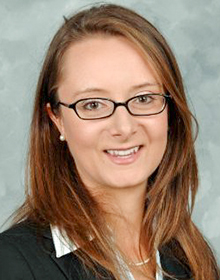 Alana Jochum
Alana Jochum
Cleveland passed non-discrimination protections for the LGBTQ community back in 2009, but an exception to the ordinance makes it legal for businesses and employers to deny transgender men and women use of the bathroom, locker room, dressing room and other facilities that matches their gender identity.
Currently, the only cities in Ohio that have fully-inclusive, non-discrimination protections are Athens, Bowling Green, Cincinnati, Cleveland Heights, Columbus, Coshocton, Dayton, Newark, Oxford, Toledo and Yellow Springs. Other cities have some protections, but not all.
Equality Ohio is working to change that by encouraging and helping cities and the state to pass fully inclusive, non-discrimination protections for everyone in the LGBTQ community,
“Fully inclusive non-discrimination protections are really important. And it’s important that we include the transgender community because the transgender community is one of the most marginalized of the LGBTQ population,” Jochum says. “Marriage equality gets a lot of the attention and is very talked about, and it really is an important bundle of rights, but it’s not the only bundle of rights.”
Ordinance 1446-13 would remove sections in Cleveland's code that allow a business or employer to “essentially decide which restroom or facility a transgender individual can use,” Jochum says. “This enhances the safety of transgender individuals who face potential harassment and violence when told they must use the facility that does not align with their gender identity.”
The issue was discussed at a Cleveland City Council hearing in November, but the ordinance was not brought to a vote.
“We get this sense that there is hesitation about Cleveland being ready for it,” she says. “Since [November,] we were encouraged to have educational forums in the community about the topic and expand the discussion.” Earlier this year, Pulitzer-prize winning journalist Connie Schultz moderated a City Club panel discussion about transgender equality and identity, and so far they have had two faith panels about transgender issues.
The discrimination transgender men and women face in Cleveland goes beyond the bathroom. Zoë Renee Lapin, a 30-year-old DJ and activist, moved back in 2008 and soon after started establishing her career as a DJ while transitioning at the same time.
“When I moved back to Cleveland, I wasn’t out and I hadn’t transitioned yet. Then I kind of came out in the middle of the beginning of my DJ career when I was just starting to actually make a name for myself. So I came out, and it wasn’t a good look in terms of the reception,” she says. “I lost a lot of ties. A lot of promoters wouldn’t work with me anymore, a lot of clubs didn’t want to work with me anymore, a lot of DJs didn’t want to work with me anymore. And it didn’t matter how talented I was.”
She said though it has been difficult, it’s allowed her to devote more time to advocacy work, including volunteering at youth programs at the LGBT Community Center of Greater Cleveland.
She also helped bring International Transgender Day of Visibility to Cleveland this year, which celebrates the lives and work of transgender individuals and advocates. Jacob Nash, who calls himself an “accidental activist” and has served on countless boards of LGBT organizations and is an independent diversity consultant and adjunct professor at Case Western Reserve University, also helped organize the event. Nash, the founder of Margie’s Hope, said although the Transgender Day of Remembrance is important, a day for recognizing living transgender individuals, advocates and allies was important.
“We need to be honored and recognized for more than the fact we’re being killed. It’s too depressing,” he says. “We need to look at what’s being done to push the community forward and changes to the laws and how people are able to transition in whatever form they want to.”
This year marks the 40th anniversary of the LGBT Community Center of Greater Cleveland, which just received a $1.8 million grant to help purchase a dedicated building for the center. The goal is, as it has always been, to provide a safe and accessible space for the LGBT community, but another focus is helping people feel safe when they're outside the center, says Maya Simek, director of programming for the LGBT center.
“The LGBT community is lumped together solely because of how we love, and there’s so much more to it than how we love and how we identify our gender,” Simek says. “We have a really great training program where we go to businesses and schools and provide some competency around, what do I need to do if I want to be an LGBT-affirming employer or what do I do if I have someone coming out or transitioning. The center works to give one-on-one safe space training to help everyone from businesses to schools to begin to develop the tools to deal with situations in a sensitive fashion.”
Howey doesn’t see herself as representing all transgender people and knows the deep prejudices and struggles they face, but she also believes that sharing her story on a stage helps eradicate stereotypes. She knows because people talk to her after the show.
“One person in Akron said, ‘You just extinguished one of my last prejudices,’” she said.
That’s certainly the hope as the show takes the stage at Playhouse Square’s "The Helen" Lab Theatre June 11-13 and June 25-27. Hundreds more people will experience Howey’s story.
The more exposure transgender individuals can get in media or in the community, the better, Howey says.
“As soon as people knew their neighbor was gay, the people who hated gays were like, ‘Oh, these girls are great’ or ‘Oh, these guys are great,’” she said. “Transgender people are still lagging behind. But it’s certainly come a long way. My play is hitting at a hot time for this particular topic, so that’s sort of fortunate.”
